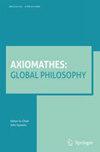数学英语中的时态
IF 0.5
3区 哲学
0 PHILOSOPHY
引用次数: 0
摘要
许多作者都对数学写作中使用现在时的相对频率和使用过去时的相对频率发表过评论。然而,据我们所知,还没有人对这种影响的大小做出估计,也没有人探讨过这种影响的普遍性。在这篇短文中,我们报告了对数学英语和日常英语语料库的分析。我们得出的结论是,数学英语中现在时与过去时的比例至少为 3:1,而日常英语中则约为 5:7。此外,我们还表明,这种偏爱现在时的倾向在书面数学中几乎普遍存在。本文章由计算机程序翻译,如有差异,请以英文原文为准。
Tense in Mathematical English
Many authors have commented on the relative frequency of the present tense—and the relative infrequency of the past tense—in mathematical writing. However, none (to our knowledge) have provided an estimate for the size of this effect or explored how universal it is. In this short note we report an analysis of corpora of mathematical and day-to-day English. We conclude that the present-to-past ratio of tenses is at least 3:1 in mathematical English, compared to approximately 5:7 in day-to-day English. Further, we show that this tendency to favour the present tense is almost universally present in written mathematics.
求助全文
通过发布文献求助,成功后即可免费获取论文全文。
去求助
来源期刊

Axiomathes
PHILOSOPHY-
CiteScore
1.10
自引率
0.00%
发文量
34
期刊介绍:
Axiomathes: Where Science Meets PhilosophyResearch in many fields confirms that science is changing its nature. Natural science, cognitive and social sciences, mathematics and philosophy (i.e., the set of tools developed to understand and model reality) exceed the conceptual framework introduced by Galileo and Descartes. Complexity and chaos; network dynamics; anticipatory systems; qualitative aspects of experience (intentionality, for example); emergent properties and objects; forward, upward, and downward causation: all portend a new scientific agenda.Axiomathes publishes studies of evolving ideas, perspectives, and methods in science, mathematics, and philosophy. Many aspects of this dawning are unknown: there will be startlingly good ideas, and many blind-alleys. We welcome this ferment. While Axiomathes’ scope is left open, scholarly depth, quality and precision of presentation remain prerequisites for publication.Axiomathes welcomes submissions, regardless of the tradition, school of thought, or disciplinary background from which they derive. The members of the journal’s editorial board reflect this approach in the diversity of their affiliations and interests. Axiomathes includes one issue per year under the title Epistemologia. Please see the tab on your right for more information about this joint publication.All submissions are subjected to double-blind peer review, the average peer review time is 3 months.Axiomathes publishes:· Research articles, presenting original ideas and results.· Review articles, which comprehensively synthesize and critically assess recent, original works or a selected collection of thematically related books.· Commentaries, brief articles that comment on articles published previously.· Book symposia, in which commentators are invited to debate an influential book with the author, who answers with a concluding reply.· Special issues, in which an expert collaborates with the journal as a guest editor, in order to identify an interesting topic in science, mathematics or philosophy, and interacts with the selected contributors, being in charge of a whole issue of the journal. Axiomathes invites potential guest-editors, who might be interested in collecting and editing such special issue, to contact the Editor in order to discuss the feasibility of the project.· Focused debates, collecting submissions and invited articles around a particular theme, as part of a normal issue of the journal.· Authors wishing to submit a reply article, or a proposal for a review article, a book symposium, a special issue or a focused debate, are invited to contact the Editor for further information.
 求助内容:
求助内容: 应助结果提醒方式:
应助结果提醒方式:


